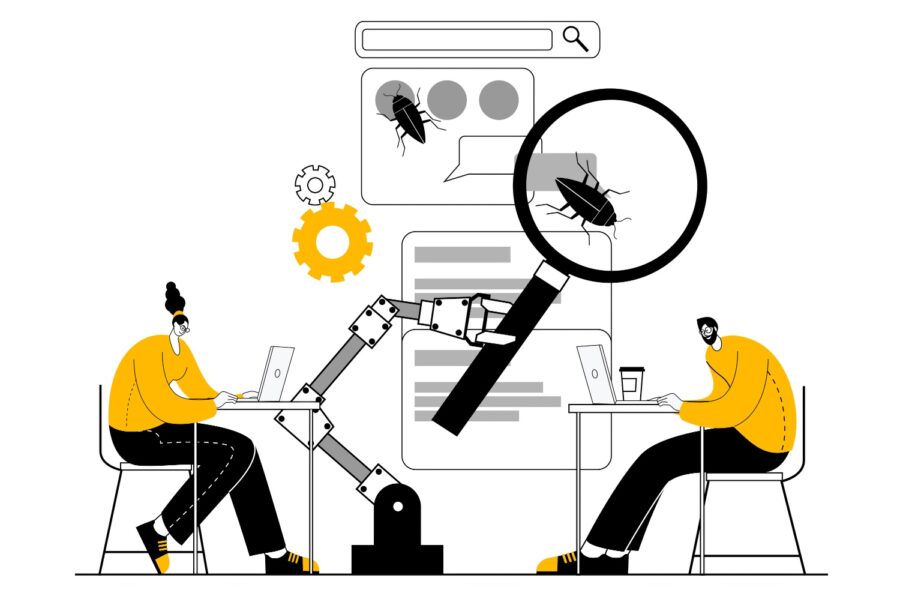The QA profession is shrouded in myths. And you’ve definitely heard at least one of them — that this is the shortest and easiest way to enter IT. Why this is not entirely true and where to study to become a tester tells Andriy Sotnikov, Automation QA Engineer at Luxoft, curator of the QA Beginning course at Projector Institute.
QA і QC: what’s the difference
First, let’s define the terms. QA — is an acronym for Quality Assurance, i.e. quality assurance. Within Quality Assurance, there is a Quality Control (QC) stage. The goal of QA is to prevent errors from occurring, while QC aims to detect them. This is theoretically the case, while in practice these processes are often referred to collectively as testing or QA, or offer the same list of tasks for both QA and QC.
QA Engineer, tester — is a specialist responsible for checking the quality of software. This is not just about software or special programs, but about any product in IT in general.
A QA engineer can be compared to a taster. He “tastes” the product before its release and analyzes it from the user’s point of view.
While we can see the result of the work of, for example, a front-end developer, the work of a tester is invisible to the user. After all, if we use a website or application and don’t encounter any problems or inconveniences, then the tester has done a good job. And vice versa, if we find bugs instead, then something probably went wrong at some point.
There are Manual QA and Automation QA. What is Manual QA? QA Manual — Manual QA is when testers check software manually. Automation QA involves working on tests based on scripts to automate testing. Those who both test the product and can write automated scripts are called General QA. Performance QA and Security QA are also often distinguished.
Main responsibilities of a QA engineer
Quality Assurance — This formulation seems abstract at first glance, but in fact it has very specific criteria. They define the functional responsibilities of a tester.
The global task of a QA engineer — provide information about the quality of the product; determine whether the finished product meets the customer’s requirements. And also to identify defects – – inconsistencies with the above requirements. A tester in IT develops and executes tests to find defects in software and make sure it meets requirements and performs its tasks. An important clarification: this must be done before the product is available to users.
What is software testing? This is a software research aimed at finding facts that indicate the quality of the product or service under test.
When we talk about bugs, we don’t just mean purely technical bugs that occur during the development phase. The concept is actually deeper than that, because a bug is also a product that does not contain a certain function, or that the user does not get what he or she expects as a result of his or her actions, etc. Some IT companies distinguish between the following types: bug, defect, error, failure, and malfunction.
Let’s summarize the main responsibilities of a tester:
- analyze product requirements;
- plan and execute manual and/or automated tests;
- identify and describe software bugs, i.e., create bug reports; inform customers about defect metrics and pass defects to developers for correction;
- cooperate with customers to eliminate software defects;
- constantly monitor product quality.
QA tester controls every stage of software development — design, development, testing, etc. He monitors compliance with software quality standards at these stages and ensures that the final product meets the requirements.
Role and list of responsibilities of a QA engineer may differ depending on the industry and the project they are working on.
What knowledge is required for Junior QA: hard skills/soft skills
Let’s summarize what a tester needs to know to apply for a Junior QA position.
Main hard skills:
- in-depth knowledge of testing methods and tools;
- Knowledge of software quality control processes (STLC — software testing life cycle), client-server architecture and API;
- ability to work with bug tracking tools;
- understanding of the software development life cycle;
- good knowledge of SQL and ability to create scripts;
- proficiency in at least one programming language — preferred but not required.
It is also important to know English at B1 level or higher and constantly improve your knowledge. After all, stakeholders or customers in IT companies are often foreigners, so all communication takes place in English.
As you can see, the set of competencies is quite a lot. So only a person who hasn’t even begun to do this can say that it’s easy and quick to master all this.
Main soft skills:
- good communication and collaboration skills;
- concentration, meticulousness;
- ability to work in a team;
- adaptability and willingness to learn.
This set of soft skills is due to the fact that a QA specialist works in a team with other specialists. Therefore, it is important for them to be able to interact effectively within it and communicate the results of their work to stakeholders.
This is a basic list of hard and soft skills. To form your own list to follow during your studies, analyze the job descriptions of QA engineers.
How to start a career as a tester
Next, let’s talk about how to become a software tester. You should start with training. It doesn’t matter if you have no experience in IT or if you already work in IT but want to change your profession. In any case, you need to acquire exactly those competencies that are a must-have for QA testing.
How long and how to study to become a tester? To answer this question, you should take into account the conditions–how much time and what opportunities you have.
A beginner tester can start with free courses on platforms like Coursera, Udemy, or YouTube. There you can learn basic theoretical knowledge. The same goes for professional literature.
You can’t go anywhere without a base, but it’s not enough. Practice is important. There are several ways to get it, too. First –try to find an opportunity to study or intern in a company. Sometimes companies look for specialists without experience but with basic technical knowledge to train them for themselves. These are the so-called Trainee QA Engineer positions. There are not many of them, but it’s worth trying to find them.
Second –go to a tester course, for example, a practical QA Engineer course. This way you kill two birds with one stone. Firstly, you will master the very base that you need for your job. As a tutor, I tell students only about the current technologies and techniques that QA needs, and do not describe all the possible ones, as in the case of general theoretical courses. Secondly, during the course, students consolidate the theory in practice under the supervision of a tutor. I give feedback and offer tasks that are common in the daily work of a tester. They also make a project for a real customer, which they can then present at a future interview.
If they complete their homework and defend the project– they receive a training certificate, which is very important for a beginner.
What is the situation in the industry
The main responsibilities and training options have been sorted out. What is the salary of a tester? This is a question that worries every beginner who wants to master the profession of an IT tester.
I have the latest results of the salary survey from DOU.
As of June 2023, the average salary of a tester was $2000. Of course, you’ll have to start with smaller amounts-$750 for Junior Manual QA or $1050 for Automation QA.
But with experience and new competencies, this number will grow.
The amount is influenced by such aspects as:
- programming language — the highest salaries for specialists who know TypeScript, then – Java and C#/.NET, and then Python and JavaScript;
- company type — outstaffing companies pay the most, followed by product, outsourcing, and startups in descending order;
- English language skills — the Upper Intermediate level is significantly better than Intermediate.
There are also interesting statistics from Djinni in hiring candidates with no work experience or less than a year of experience. Thus, from the beginning of 2023 to August, QA ranked second with a share of 11.29% of all hires. This means that companies are ready to hire testers with no experience.
So, he told us the main things about the profession that is very popular among the world’s techies nowadays,– QA Engineer. The rest is up to you. Take the next step– go to study. IT loves the brave and persistent.



Loading comments …